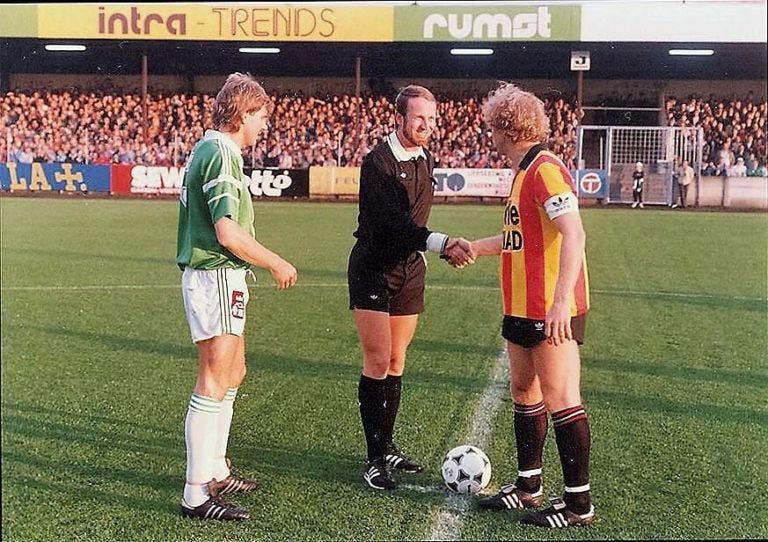Mechelen
A Tale Of Two Clubs - Racing Club Mechelen and KV Mechelen
The city of Mechelen lies within the province of Antwerp. It is home to two football clubs—Koninklijke Racing Club Mechelen and KV Mechelen—both formed in 1904. They are distinct clubs with different histories and support bases—this naturally makes them rivals. A rivalry perhaps only truly appreciated by Mechilinians. KV Mechelen has a broader support base, drawing fans from across the Antwerp province and beyond, whereas Racing’s support is significantly more localised.
Image copyright - Racing Mechelen
Racing was founded in 1904 with the intention of being a secular club for the city with liberal inclinations; this secular and liberal orientation positioned Racing as a club appealing to a specific section of Mechelen society, in particular those less likely to be aligned with any religious institution. KV Mechelen, in contrast, has historically had a connection with broader working-class and Catholic communities. Both clubs formations coincide with the early years of football development in Belgium, with Racing having matricule No. 24 and KV with matricule No. 25. The intra-city class and cultural divides are more complex than at first sight. Racing has close community ties to Mechelen-Noord’s working-class identity, due largely in part to the location of their stadium, the Oscar Vankesbeeckstadion, in the heart of the working-class industrial suburb of Mechelen-Noord. Racing’s choice of green and white as colours is a deliberate signal of this localised, anti-establishment working-class identity.
Image copyright - Racing Mechelen
Belgium is a complex country, divided by both linguistic and cultural factors. Mechelen as a city is located on the Flemish-Walloon linguistic border, and Racing’s name sees a number of subtle but not unimportant name changes, first to Racing Club Mechelen Koninklijke Maatschappij in 1937 and later in 1957 to Koninklijke Racing Club Mechelen. The rivalry with KV is rooted in both class and geographical distinctions, i.e., Racing’s urban base and KV’s more suburban and broader base. Racing in many respects epitomises a club's role as a community anchor, which resists the arguably necessary commodification of modern football. While never achieving major trophy success, their pinnacle is finishing as runners-up during the 1951/52 top-flight season to RFC Liege. They also reached and lost the 1954 Belgian Cup Final to Standard Liège. Racing’s legacy undoubtedly lies in its deep-rooted connection to the community.
KV Mechelen’s roots are equally entwined with the city, but in a different way. Traditionally KV was the club of the Catholic community; however, over time the club has taken on much broader support from across the Antwerp province and Flanders, mirroring their wider growth and footballing success. The class distinctions between the sides were more pronounced in the early years of both clubs. Originally named FC Malinois, reflecting the French name for Mechelen (Malines), the club later adopted the Flemish name Koninklijke Voetbalclub Mechelen (KVM) in 1970 to reflect the growing confidence and influence of the Flemish cultural and linguistic movement. KV's broadening growth is also attributable to two other factors: major post-war successes on the pitch in winning 4 Belgian Championship titles in 1943, 1946, 1948, and 1989; 2 Belgian Cups in 1987 and 2019; and their economic golden age in the 1980s under then-owner John Cordier, who financed a side that still remains the last Belgian club to win a European trophy, when they defeated Ajax 1-0 in the 1988 Cup Winner’s Cup Final in Strasbourg. The following season saw Malinwa lifting the European Super Cup with a 3-1 aggregate win over PSV Eindhoven.
The rivalry of the ‘Mechelse stadsderby’ remains culturally significant to the city, though its intensity has perhaps waned due to the clubs fortunes having diverged dramatically.
KV Mechelen today plays in Belgium’s top flight, the Pro League, whereas Racing has rapidly fallen down the divisions since 2015 and is now an amateur club, with a lack of resources that makes building a modern and competitive infrastructure increasingly difficult, although they do now have plans to build a new stadium, which they also hope will be home to the city’s basketball side, Mechelen Kangoeroes.
Mechelen’s football culture is also (not unsurprisingly) tied to the city’s beer culture, as in many Belgian cities, with select bars and cafes being gathering points for both sets of fans. Mechelen’s brewing heritage is centred on Het Anker Brewery, which is responsible for producing the city’s two most well-known beers, Gouden Carolus and Maneblusser, translated as ‘moon extinguishers,’ a popular nickname for locals dating from a 1687 incident in which locals mistook the moon’s reddish glow filtering through the fog for a fire in St. Rumbold’s Cathedral Tower and consequently rushed to put it out—only to realise their mistake. Both these beers are symbols of significant local pride in a similar way that both clubs are.
Image copyright - Scott Coyne
The sides last met competitively at a senior level in 2005 for a Belgian Cup tie, and that fixture was abandoned due to crowd violence. However, Jong KV Mechelen (KVM's development side) did meet Racing as recently as 2025 in the amateur divisions.




